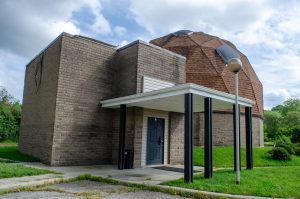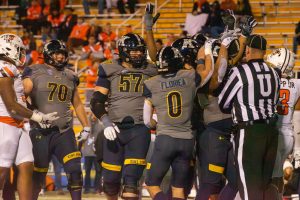Petition for no-confidence vote against provost introduced at Faculty Senate
May 12, 2015
A Kent State professor introduced a petition at Monday’s Faculty Senate meeting calling for a vote of no confidence against Provost Todd Diacon.
The petition was created in response to Diacon’s vote against giving a School of Art professor tenure earlier this year. George Garrison, a Pan-African Studies professor and member of Faculty Senate, introduced the petition, calling Diacon’s decision-making “autocratic.”
The controversy stems from the School of Art professor, Navjotika Kumar, who applied for tenure and was denied by the provost. According to Garrison, Kumar received 29 unanimous yes votes from the Tenure Review Committee, as well as four unanimous yes votes from external reviewers and yes votes from the director of the School of Art and the dean of the College of the Arts. However, the provost voted no, and she was denied tenure.
President Beverly Warren said there are eight levels in the Reappointment, Tenure and Promotion (RTP) process, during which professors apply for tenure. If they are not approved for tenure, they lose their job within one year.
If they are denied tenure, professors can file an appeal with the Joint Appeals Board. The board makes a recommendation, and the president makes the final decision. Warren, who said she has four decades of experience in tenure review, said she has never gone against the board’s recommendation at Kent State.
If the president votes no, the professor can file a grievance with the American Association of University Professors at Kent State University (AAUP-KSU).
Both Kumar and her husband were present at the meeting; Kumar made a statement calling for justice.
Garrison called the RTP process “flawed.”
“We have a system here that is flawed. It is not working. This problem runs so deep that there hasn’t been any remorse, any apology, or attempt to fix this problem that is flawed,” Garrison said. “It is a voice crying out in the wilderness protesting a system that’s flawed. You’re going to deny your colleagues the chance to protest when they’re losing their jobs and when their lives are being destroyed?”
Who signed the petition?
83 full-time professors signed their names to the petition, representing the Colleges of Applied Engineering, Sustainability and Technology; the Arts; Arts and Sciences; Communication and Information; Education, Health and Human Services; and Nursing.
27 full-time professors signed the petition anonymously.
The petition has 110 unverified signatures total.
Garrison would need 17 more named signatures to avoid the issue of anonymous signatories.
The Faculty Senate bylaws say a petition needs 100 valid, verified signatures to be considered.
Warren acknowledged there might be problems with the system.
“We need greater clarity in the RTP process. We need to reestablish trust and civil discourse,” she said. “Certainly we can improve our process. We can improve how we defend our judgments. We can be more rigorous about how we pursue the process.”
However, both Warren and Faculty Senate Chair Lee Fox-Cardamone expressed disapproval for the petition.
“I’m deeply concerned because for me, these are serious allegations about the entire administration,” Warren said. “I understand that stress, and I understand the concern. But I don’t think this is the right way for us to move forward.”
The petition has 83 named signatures and 27 anonymous signatures, for a total of 110 signatures. At the meeting, Garrison read all the names from the petition, including acknowledging the anonymous names by reading, “professor 1, professor 2…” and so on. This was met with annoyance from many of the senators; groans and calls of “come on” could be heard.
Garrison collected these signatures electronically via email, which many senators said was an acceptable method to collect signatures. However, senators took issue with the 27 anonymous signatures.
“It’s an oxymoron to say that a signature is anonymous,” said Senator and sociology professor Susan Roxburgh.
“I think you should have the guts to say, ‘This is my vote,” said Senator and Geauga campus math professor Jay Jahangiri.
Because there is no mention of anonymous signatures in Kent State’s charter or constitution, senators did not know if these signatures are valid.
Garrison said the reason the 27 professors chose to sign their names anonymously was because they are currently in the RTP process or will be in the future and fear their jobs will be jeopardized if they are named as signatories.
“(These) faculty don’t want their careers jeopardized for expressing their concerns about a process that is clearly flawed,” he said.
Garrison also said Fox-Cardamone would receive a list of the 27 anonymous names so she could verify them, but he did not want the list to be public.
In order for the no-confidence vote to take place, the petition must have 100 valid signatures of full-time professors. All signatories have to be verified to prove they did in fact choose to sign the petition and are valid full-time Kent State professors. If Garrison is able to get 100 valid signatures, a referendum for a vote by all valid Kent State faculty would be initiated by Faculty Senate.
Fox-Cardamone, Faculty Senate chair, agreed to verify the names, although she said she could not guarantee the names would remain anonymous and disagreed with the petition overall.
“This sets a precedent. I’m not in favor of retreating behind a cloak of anonymity,” Fox-Cardamone said. “I don’t know if I can guarantee anonymity. I’m not happy about this. I would much prefer a cleaner petition with names, with signatures, but I am willing to verify.”
Senator David Dees, director for the Center of Teaching and Learning, suggested Garrison attempt to get 17 signatures from people who are willing to be named, making the controversy over the anonymous signatories a non-issue.
The Senate voted to schedule a vote for its July 20 meeting on whether petitions can include anonymous signatures.
The last petition introduced in Faculty Senate was in regards to the plus/minus grading system. The petition, introduced by Senator and associate philosophy professor Linda Williams, received 130 signatures. After verification, only 104 signatures were valid.
Williams said the president of Faculty Senate at the time told her she could not have anonymous signatures.
The last vote of no confidence took place in 1999 against former Kent State President Carol Cartwright. According to a previous KentWired article, of the 650 returned ballots, 396 expressed confidence and 254 ballots expressed no confidence. Therefore, the vote of no confidence did not pass.
During the nearly three-and-a-half hour meeting, the Senate also approved changes to the student dismissal process and post-secondary education and approved a new business analytics major.
Contact Emily Mills at [email protected]. Jimmy Miller contributed reporting.














